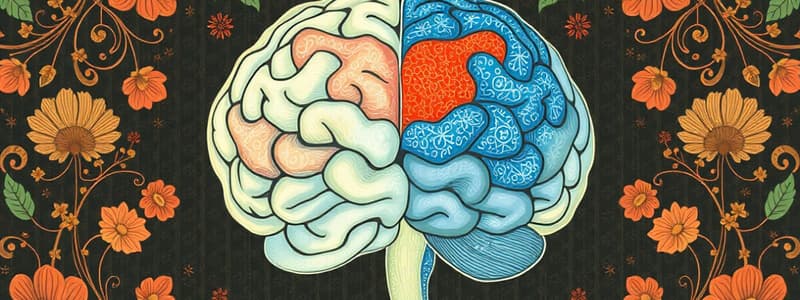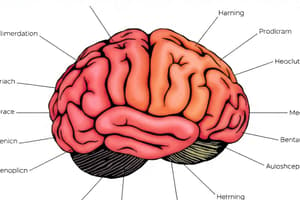Podcast
Questions and Answers
What is the primary role of memory in the context of knowledge acquisition?
What is the primary role of memory in the context of knowledge acquisition?
- Learning new behaviors and skills
- Providing feedback on learned behaviors
- Encoding, storing, and retrieving information (correct)
- Modifying existing knowledge structures
Which of the following best characterizes the memory deficit experienced by H.M. after his surgery?
Which of the following best characterizes the memory deficit experienced by H.M. after his surgery?
- Inability to transfer new short-term memory into long-term memory (correct)
- Inability to recall experiences from before the surgery
- Loss of all types of memory including short-term and long-term
- Decreased IQ and language comprehension abilities
What type of memory does H.M. retain that allows him to remember events prior to his operation?
What type of memory does H.M. retain that allows him to remember events prior to his operation?
- Short-term memory
- Semantic memory
- Implicit memory
- Explicit memory (correct)
What aspect of his behavior demonstrated H.M.'s memory impairment during visits with his doctor?
What aspect of his behavior demonstrated H.M.'s memory impairment during visits with his doctor?
Which region of the brain is identified as crucial for memory according to studies of patients like H.M.?
Which region of the brain is identified as crucial for memory according to studies of patients like H.M.?
What is the main finding of Dr. Penfield's studies related to the temporal lobes?
What is the main finding of Dr. Penfield's studies related to the temporal lobes?
What distinguishes implicit memory from explicit memory?
What distinguishes implicit memory from explicit memory?
What type of learning does NOT involve the conscious recall of information?
What type of learning does NOT involve the conscious recall of information?
What primarily composes the hippocampus?
What primarily composes the hippocampus?
Which structure serves as a main pathway for information entering the hippocampus?
Which structure serves as a main pathway for information entering the hippocampus?
Which cells communicate with the pyramidal cells of the hippocampus?
Which cells communicate with the pyramidal cells of the hippocampus?
What role does the subiculum play in the hippocampal structure?
What role does the subiculum play in the hippocampal structure?
Information directed to the hippocampus comes from which of the following structures?
Information directed to the hippocampus comes from which of the following structures?
What is the appearance of the hippocampus due to its structural folding?
What is the appearance of the hippocampus due to its structural folding?
Through which bundle of fibers does the hippocampus send information to various parts of the CNS?
Through which bundle of fibers does the hippocampus send information to various parts of the CNS?
How does the dentate cells contribute to the functionality of the hippocampus?
How does the dentate cells contribute to the functionality of the hippocampus?
What type of memory is referred to as implicit memory?
What type of memory is referred to as implicit memory?
Which brain structures are primarily involved in explicit memory?
Which brain structures are primarily involved in explicit memory?
What is a characteristic of patients with bilateral lesions of the temporal lobe regarding learned tasks?
What is a characteristic of patients with bilateral lesions of the temporal lobe regarding learned tasks?
What type of memory is associated with the recall of facts about people, places, and things?
What type of memory is associated with the recall of facts about people, places, and things?
Which areas synthesize visual, auditory, and somatic information for memory processing?
Which areas synthesize visual, auditory, and somatic information for memory processing?
What effect does damage to the hippocampus have on memory?
What effect does damage to the hippocampus have on memory?
What role do the hippocampi play in relation to the limbic lobe?
What role do the hippocampi play in relation to the limbic lobe?
What commonly results from damage to the areas that deal with the motor cortex regarding memory?
What commonly results from damage to the areas that deal with the motor cortex regarding memory?
What condition is characterized by both anterograde and retrograde amnesia, along with confabulation and hallucinations?
What condition is characterized by both anterograde and retrograde amnesia, along with confabulation and hallucinations?
Which structures are primarily damaged to cause anterograde amnesia?
Which structures are primarily damaged to cause anterograde amnesia?
Which vitamin deficiency is linked to Wernicke-Korsakoff syndrome?
Which vitamin deficiency is linked to Wernicke-Korsakoff syndrome?
What is a common symptom of Wernicke encephalopathy?
What is a common symptom of Wernicke encephalopathy?
What type of memory is the result of several related but distinct types of processing, including encoding and retrieval?
What type of memory is the result of several related but distinct types of processing, including encoding and retrieval?
Which of the following cognitive functions declines in dementia patients, often resulting in global amnesia?
Which of the following cognitive functions declines in dementia patients, often resulting in global amnesia?
In patients reliant on thiamine, which metabolism is notably affected, leading to amnesic conditions?
In patients reliant on thiamine, which metabolism is notably affected, leading to amnesic conditions?
What area of the brain is primarily associated with the processing of explicit memories?
What area of the brain is primarily associated with the processing of explicit memories?
What type of memory is primarily impacted by lesions of the right hippocampus?
What type of memory is primarily impacted by lesions of the right hippocampus?
What does damage to the association cortex typically result in?
What does damage to the association cortex typically result in?
H.M.'s condition illustrates which aspect of memory functioning?
H.M.'s condition illustrates which aspect of memory functioning?
What is a characteristic of amnesia as clinically defined?
What is a characteristic of amnesia as clinically defined?
What is the role of the association cortices in memory?
What is the role of the association cortices in memory?
What might be a consequence of damage to a specific cortical area?
What might be a consequence of damage to a specific cortical area?
Which of the following best describes retrograde amnesia?
Which of the following best describes retrograde amnesia?
What aspect of memory is NOT typically stored in the hippocampus?
What aspect of memory is NOT typically stored in the hippocampus?
Flashcards are hidden until you start studying
Study Notes
Learning and Memory
- Learning and memory are intertwined processes. Learning is the acquisition of knowledge, while memory encodes, stores, and retrieves that knowledge.
- Learned behaviors include motor skills, language, and social behaviors.
- Dysfunctional behaviors, such as those associated with psychological disorders, are also learned.
- The study of learning and memory is crucial for understanding behavioral disorders.
Memory Types
- Memory is classified as implicit or explicit.
- Implicit memory is unconscious and involves skills and habits.
- Explicit memory is conscious and is related to factual knowledge.
Brain Regions and Memory
- The temporal lobes play a significant role in memory.
- Studies on patients with temporal lobe lesions, like H.M., provide evidence of the hippocampus's importance in memory.
- H.M. experienced amnesia, specifically an inability to transfer short-term memory into long-term memory after surgery.
- H.M. retained good short-term memory and long-term memories for events prior to the surgery.
- H.M. had difficulty with spatial orientation.
- Damage to the motor cortex impairs implicit memory.
- Damage to the hippocampus or associated temporal cortex regions impairs explicit memory.
- The amygdala is not directly involved in explicit memory.
Hippocampus and Fornix
- The hippocampus is located within the temporal lobes.
- It plays a role in connecting cortical regions involved in emotional behavior.
- The hippocampus receives input from various cortical regions and sends output via the subiculum and pyramidal cells.
- The hippocampus is connected to other brain regions through the fornix.
Explicit Memory Processing
- Explicit memories are processed in association cortices, including the prefrontal, limbic, and parieto-occipital-temporal cortices.
- These areas synthesize sensory information and relay it to the parahippocampal cortex, entorhinal cortex, dentate gyrus, and hippocampus.
Memory and Lesions
- Lesions in the right hippocampus are associated with spatial orientation deficits.
- Lesions in the left hippocampus are associated with verbal memory impairments.
Long-Term Memory and Neocortex
- The hippocampus acts as a temporary storage site for long-term memory.
- The association cortex is the final storage location for explicit memories.
- Damage to association cortices can result in difficulty recalling specific facts, recognizing faces, objects, and places.
Amnesia
- Amnesia refers to a primary deficit in long-term memory.
- It usually involves both retrograde amnesia (loss of memories before injury) and anterograde amnesia (inability to form new memories).
- Anterograde amnesia often results from bilateral damage to the medial temporal lobes, including the parahippocampus and hippocampus.
- Wernicke-Korsakoff syndrome is a type of amnesia caused by thiamine deficiency.
Wernicke-Korsakoff Syndrome
- This syndrome is characterized by anterograde and retrograde amnesia, confabulation, and hallucinations.
- It often occurs in individuals with chronic alcoholism or those who have undergone gastric procedures.
- The syndrome is associated with a reduction in the size and function of the mammillary bodies.
Memory Conclusion
- Memory has different stages and long-term memory is stored in various regions of the nervous system.
- Explicit and implicit memory involve different neuronal circuits.
- Explicit memory involves a series of processes: encoding, consolidation, storage, and retrieval.
Studying That Suits You
Use AI to generate personalized quizzes and flashcards to suit your learning preferences.



